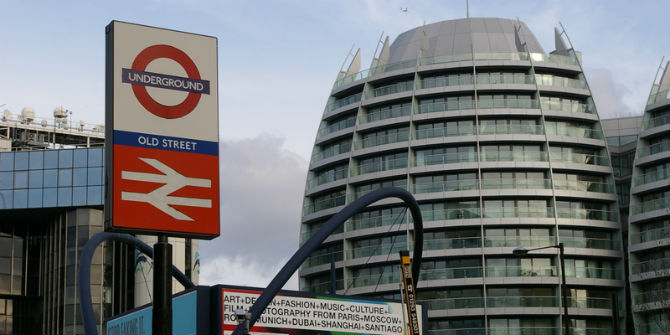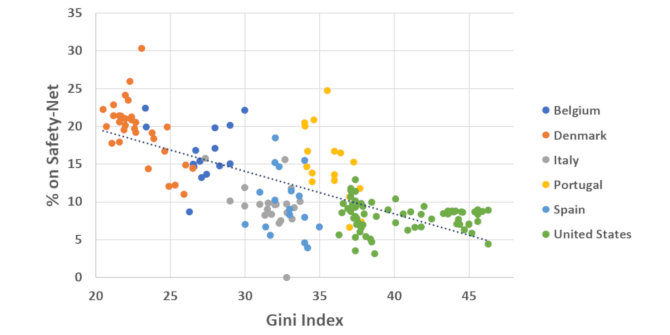 What will the economic impact of Theresa May’s deal be? And how does it compare to the no-deal scenario?The LSE’s Centre for Economic Performance, in association with The UK in a Changing Europe, has modelled both scenarios and examined the effects on migration, fiscal policy, trade and productivity. The authors – Anand Menon, Jonathan Portes, Peter Levell and Thomas Sampson – also look at the relative cost of the ‘divorce bill’ – the payments the UK has agreed to make to the EU.
What will the economic impact of Theresa May’s deal be? And how does it compare to the no-deal scenario?The LSE’s Centre for Economic Performance, in association with The UK in a Changing Europe, has modelled both scenarios and examined the effects on migration, fiscal policy, trade and productivity. The authors – Anand Menon, Jonathan Portes, Peter Levell and Thomas Sampson – also look at the relative cost of the ‘divorce bill’ – the payments the UK has agreed to make to the EU.
Our modelling leads us to estimate that the Brexit deal could reduce UK GDP per capita by between 1.9% and 5.5% in ten years’ time, compared to remaining in the EU. The cost to the public finances would be between 0.4% and 1.8% of GDP over the same period, and the corresponding figures for a no deal Brexit would be 1% to 3.1%.

Taken together, the estimates imply that no deal would, in the long term (ignoring the impacts of short-term disruption), lead to a reduction in UK GDP per capita, compared to the ‘baseline’ of remaining an EU member, of 3.5% to 8.7%—the large range reflecting the very substantial uncertainties involved. The negative impact of the proposed deal would be smaller, but still substantial, amounting to between 1.9% and 5.5% of GDP per capita.
Such a large economic impact would also have major implications for the public finances. These would far outweigh any gains resulting from reduced EU contributions. The Institute for Fiscal Studies has estimated that if the impacts on GDP were as estimated above, then in a no deal scenario the cost to the public finances would be between 1% and 3.1% of GDP, and between 0.4% and 1.8% if the deal was implemented. This is even after taking account of the long-term saving on the UK’s net EU contributions of 0.4% of GDP.
Clearly, these figures are significant. Clearly, too, their impact would be felt over time. For all the talk about a Brexit ‘cliff edge,’ should the withdrawal agreement be signed and subsequently ratified (admittedly a big if at the moment), the UK would continue to trade with the EU on essentially the same terms until the end of the transition period. Only thereafter would the practical impact of Brexit be felt.
Nevertheless, our findings imply challenges ahead for policy makers. The scale of impact that we have estimated will make it harder to achieve key public policy objectives. Difficult choices, particularly about taxation and spending, will have to be made. And there is little if any sign that the starkness of these choices has yet been appreciated, not least by the two main political parties, both of whose manifestos for the 2017 seemed to imply that a post-Brexit world would be one of business as usual.
We should of course stress that our results are subject to a high degree of uncertainty, relating both to the inherent difficulties in economic modelling, and to the vague and aspirational nature of the Political Declaration on the future relationship, which mean that some key elements are still to be determined. Moreover, we do not attempt to model the short-term disruption resulting from no deal, which was the subject of an earlier UK in a Changing Europe report, Cost of No Deal Revisited.
Moreover, our work is based on a number of assumptions, some of them subjective, which are set out clearly and transparently. A central estimate from the empirical literature is that a 1% decline in trade reduces income per capita by around 0.5%. To estimate the implications for the government finances, we assume that a 1% fall in GDP per capita reduces government revenue by 0.4% of GDP. The conclusions of the report are consistent with both economic theory and the empirical literature.
We carried out this exercise because we believe the public and political debates to come should be informed by the best available analysis of what the deal on offer actually means. We do not take any position of which of the three scenarios we examine is preferable. There are many other considerations than simply economic ones, and the role of our organisation is to provide evidence and not to tell people what to make of it.
However, we believe that not enough attention has been paid in the debate over Brexit to the trade-offs it implies. The profusion of ‘cakeism’ has meant that leading Brexiters have been unwilling to discuss what price is worth paying in order that the UK leave the EU. A necessary first step in any such debate is knowing what that price might turn out to be. We believe our estimates provide a clear indication of the broad scale of the impact of the deal negotiated by the Prime Minister.
Please read our comments policy before commenting.
Note: This article first appeared at our sister site, LSE Brexit. It gives the views of the authors, not the position of EUROPP – European Politics and Policy or the London School of Economics. The full report is available here.
_________________________________




Like so much crystal-ball glazing around Brexit, the guesswork omits the elephant in the room of uncontrolled immigration and the impact on the costs of housing and increased demand for public services and transport.
An increased GDP per head isn’t much good to anyone if the cost of living increases.
Many people think that easier access to growing WTO markets will result in increased GDP – and more importantly, if immigration is controlled, GDP per capita.
And as for Government income being less than expected …..
If immigration reduces, the cost of housing should reduce – and pressure on schools, health and transport should reduce – so Government expenditure should be less tha previously assumed.
It is indeed to advance qualify the economic costs of leaving the EU and of no deal. No deal at present means no transition period. No transition period would definitely have high short term costs and long term costs that are unknown.. We know the British car Industy is heavily integrated into Europe but not how much other sectors are…
I am a Remainer who agrees with membership of the EU on political grounds as well as economic. If it was clearly economically disastrous to be an EU member, then I would support Leave… As the overwhelming evidence is that it is economically advantageous to be a member, my wish for a strongly integrated voluntary confederation of EU states is re-enforce. I want to be an EU citizen. I want to be English, British, and European…